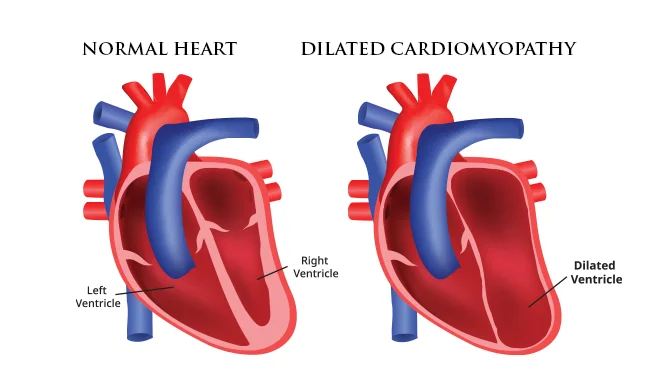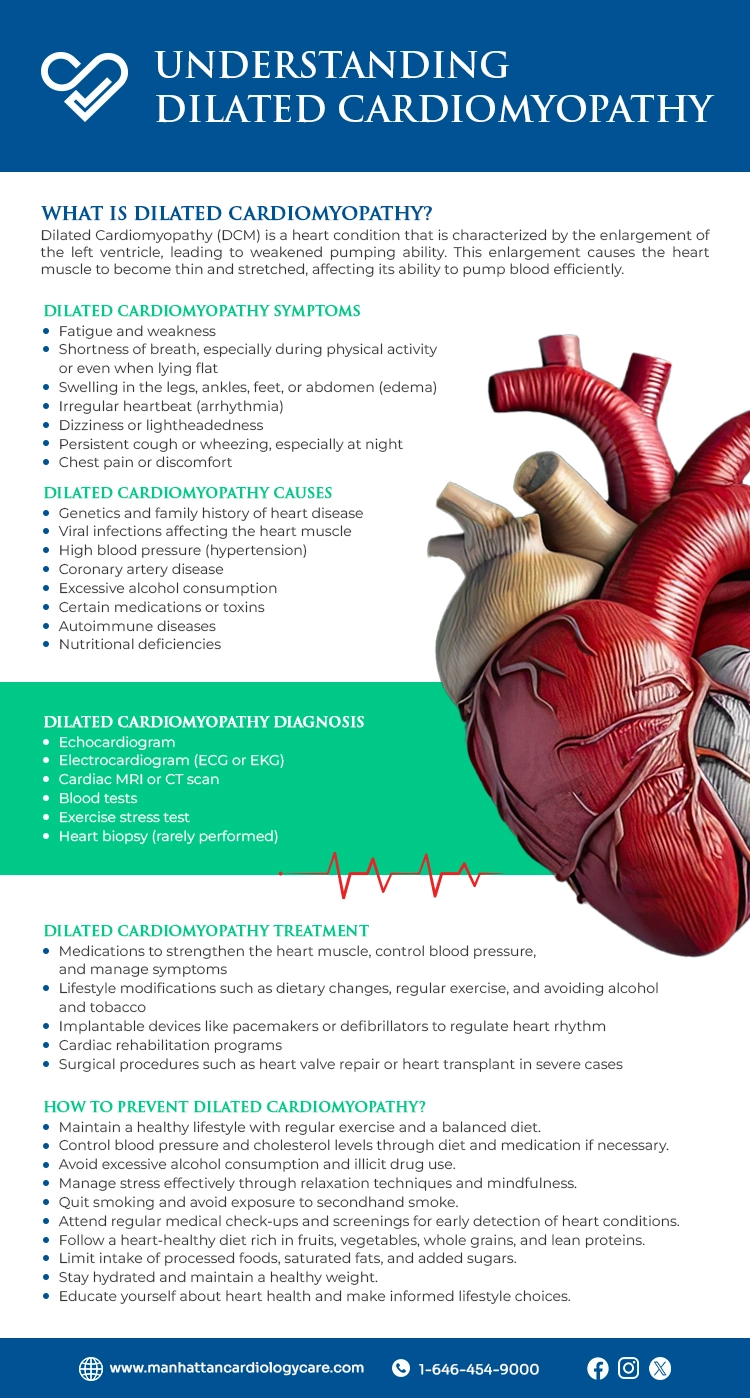Does your heart ever make you feel like it’s working overtime, and is struggling to keep up with demands of life?
Ever experienced fatigue or shortness of breath without a related reason, making you wonder if there’s something wrong with your heart? If your answer is yes, you’re not alone – In fact, there are millions of people who’re affected by this condition known as Dilated Cardiomyopathy.
Today we will discover what is Dilated Cardiomyopathy and how it impacts the health of your heart.
Table of contents
What is Dilated Cardiomyopathy?
Dilated Cardiomyopathy (DCM) is a heart condition that is characterized by the enlargement of the left ventricle, leading to weakened pumping ability. This enlargement causes the heart muscle to become thin and stretched, affecting its ability to pump blood efficiently. As a result, vital organs may not receive sufficient blood supply, leading to various symptoms and complications.
Dilated Cardiomyopathy Symptoms
Dilated Cardiomyopathy symptoms can vary from person to person, however these symptoms commonly include:
- Fatigue and weakness
- Shortness of breath, especially during physical activity or even when lying flat
- Swelling in the legs, ankles, feet, or abdomen (edema)
- Irregular heartbeat (arrhythmia)
- Dizziness or lightheadedness
- Persistent cough or wheezing, especially at night
- Chest pain or discomfort
Dilated Cardiomyopathy Causes
While the exact Dilated Cardiomyopathy causes may not always be clear, there are several factors that can contribute to its development, including:
- Genetics and family history of heart disease
- Viral infections affecting the heart muscle
- High blood pressure (hypertension)
- Coronary artery disease
- Excessive alcohol consumption
- Certain medications or toxins
- Autoimmune diseases
- Nutritional deficiencies
Dilated Cardiomyopathy Diagnosis
Dilated Cardiomyopathy diagnosis typically involves a combination of medical history review, physical examination, and a list of diagnostic tests, such as:
- Echocardiogram
- Electrocardiogram (ECG or EKG)
- Cardiac MRI or CT scan
- Blood tests
- Exercise stress test
- Heart biopsy (rarely performed)
Dilated Cardiomyopathy Treatment
Dilated Cardiomyopathy treatment aims to alleviate the symptoms, improve heart function, and prevent any further complications from occurring.
Dilated Cardiomyopathy treatment options may include:
- Medications to strengthen the heart muscle, control blood pressure, and manage symptoms
- Lifestyle modifications such as dietary changes, regular exercise, and avoiding alcohol and tobacco
- Implantable devices like pacemakers or defibrillators to regulate heart rhythm
- Cardiac rehabilitation programs
- Surgical procedures such as heart valve repair or heart transplant in severe cases
How To Prevent Dilated Cardiomyopathy?
Care is better than cure – taking timely preventive measures can keep you from being affected and eventually having to opt for Dilated Cardiomyopathy treatments.
Here’s a list of preventive measures:
- Maintain a healthy lifestyle with regular exercise and a balanced diet.
- Control blood pressure and cholesterol levels through diet and medication if necessary.
- Avoid excessive alcohol consumption and illicit drug use.
- Manage stress effectively through relaxation techniques and mindfulness.
- Quit smoking and avoid exposure to secondhand smoke.
- Attend regular medical check-ups and screenings for early detection of heart conditions.
- Follow a heart-healthy diet rich in fruits, vegetables, whole grains, and lean proteins.
- Limit intake of processed foods, saturated fats, and added sugars.
- Stay hydrated and maintain a healthy weight.
- Educate yourself about heart health and make informed lifestyle choices.
When To See a Doctor?
If you experience any Dilated Cardiomyopathy symptoms or have risk factors for heart disease, it’s essential to seek medical attention promptly. Early diagnosis and treatment can significantly improve outcomes and quality of life.
Don’t wait until it’s too late. Your heart health matters, and our team at Manhattan Cardiology Care is here to help.
Disclaimer
This blog is for informational & educational purposes only, and does not intend to substitute any professional medical advice or consultation. For any health related concerns, please consult with your physician, or call 911.

